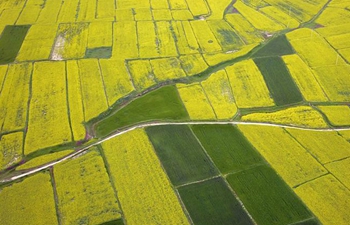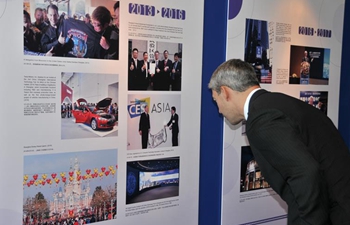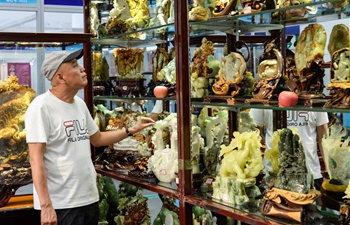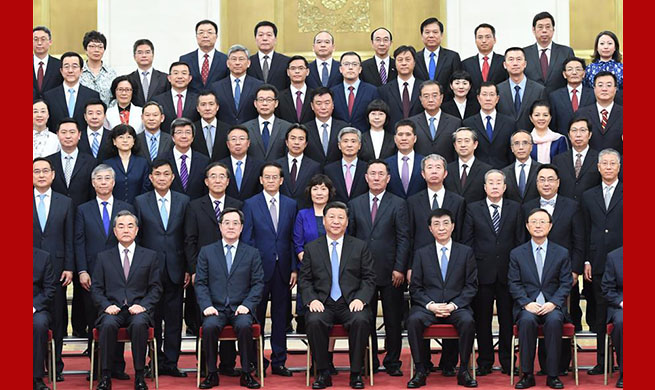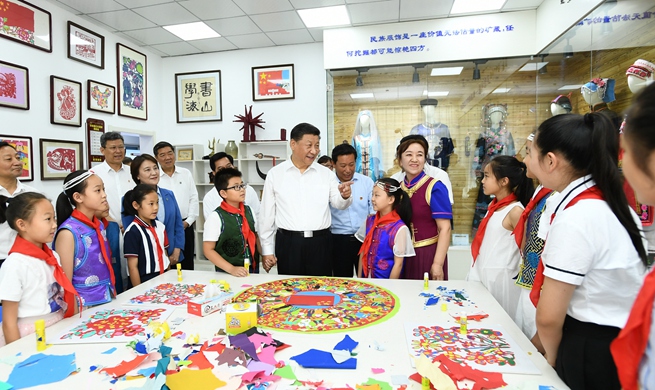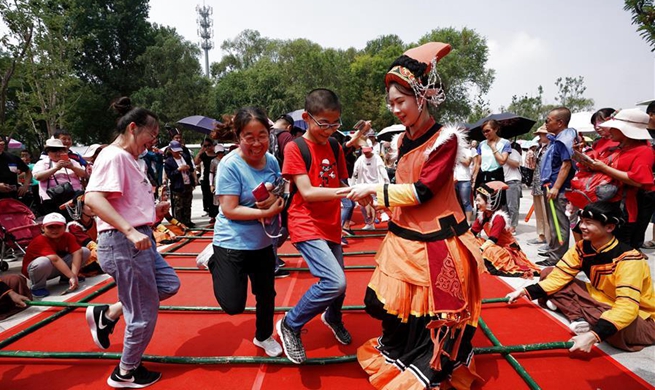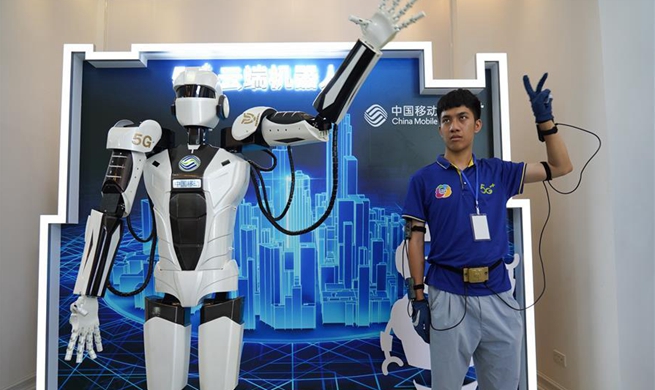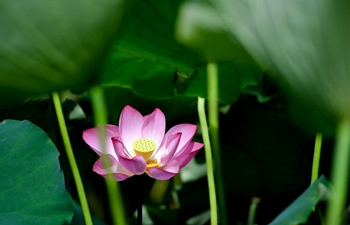by Xinhua Writer Yao Yuan
BEIJING, July 18 (Xinhua) -- In Beijing's Beihang University, imaginations of China's future lunar explorations are stored in three metal tanks.
In the interconnected cabins, squirming larva known as yellow mealworms are precious, if not palatable, meat dishes, and vegetables come from two lush gardens that feed on the byproducts of human metabolism, including carbon dioxide and excrement.
The 160-square-meter facility, which draws its name Yuegong-1, or Lunar Palace 1, from the Chinese legend of moon goddess Chang'e, is testing the possibility of having a manned base on the moon.
Every animal and plant species entering the cabins is handpicked by scientists: strawberries are selected as the sole fruit plant as most parts of the berry are edible; mealworms are raised as source of animal protein as "it's hard to build emotional links with" -- having to eat a pet does no good to the astronaut's mental health.
As supplying materials in outer space is extremely expensive, the bioregenerative life support system (BLSS) creates a closed environment where most substances necessary for human life like water, oxygen and food can be regenerated through biochemical process of the waste.
"The nearest application of our technology will be in a lunar base. So far, the system has achieved 98-percent self sufficiency, which is good enough for a base on the moon, or even on Mars," said Liu Hong, chief designer of the BLSS of Yuegong-1.
Last year, two groups of eight volunteers completed a 370-day test living in the lab, setting a new world record for the longest stay in such a self-contained cabin.
"Our next goal is to adjust this system so it can work in a lunar environment, which has no magnetic field, one sixth of Earth's gravity and a higher radiation level. We hope to create a miniature system and run it on a space station," Liu said.
Fifty years after homo sapiens left their footprints on the moon, this lab in the Chinese capital suggests that the dream of revisiting the moon is pulsating with life in China, whose lunar aspiration goes well beyond repeating the 1969 astronautic feat by American astronauts.
Flying to the moon used to be a distant dream for China, a newcomer in the space club. Its first satellite, Dongfanghong-1, lifted off in 1970. Its first moon orbiter Chang'e-1 was launched in 2007, nearly half a century after the former Soviet Union and the United States sent theirs to fly by the moon.
But the past decades have seen China speedily catching up in outer space exploration. Earlier this year, Chang'e-4 became the world's first probe to soft-land on the far side of the moon.
In April, the China National Space Administration said it aimed to build a scientific research station in the south polar region of the moon and realize a manned lunar exploration mission in about 10 years.
These steady streams of progress help boost enthusiasm about outer space in Chinese society. While conspiracy theories about the Apollo-11 moon landing being fabricated continued to thrive in the West, giant statues of astronauts popped up in Beijing's commercial districts like Wangfujing and Xidan days before the 50th anniversary of the historic lunar mission.
"I hope one day, we Chinese can also land on the moon. It's not only a thing for the nation to be proud of, it can also promote scientific knowledge among the public," said Jun Mo, whose team designed a spaceman portrait outside a photography studio in Xidan.
On China's popular microblogging site Sina Weibo, the personified account of Yutu, China's first moon rover, has over 733,200 followers. Its farewell message, posted after it ceased functioning in 2016, received more than 85,000 emotional comments from Chinese netizens.
"Its popularity demonstrates the tremendous public interest in lunar programs. It is an encouraging sign that the Chinese public care so much about space explorations, which have little to do with their everyday lives," said Ji Shaoting, who designed the Yutu account.
Chen Qiufan, Chinese sci-fi writer and author of "The Waste Tide," said China is embracing outer space as a result of the country's growing national strength and the citizens' heightened scientific literacy.
"Onboard the lunar and space projects are China's technological prowess and aspiration, as well as man's primal curiosity about the unknown," he said.
INSPIRING POWER
Dai Jianfeng, a photographer who has travelled across the globe to capture the beauty of starry nights, drew his latest inspiration from China's lunar missions.
"Witnessing our progress in space makes me wonder if one day, I can travel to the moon to take photos of the stars," he said.
The moon has been a source of inspiration in many ancient cultures. In China, the first lunar journey by human appeared in the story of Chang'e, who flew to the moon after swallowing an immortality pill.
In more recent times, the celestial body has featured in a number of science fiction works, from Jules Verne's 19th century novel "From the Earth to the moon" to the Golden Age masterpiece "2001: A Space Odyssey," having inspired generations of readers on humanity's relationship with the universe.
Chinese sci-fi writers who talked to Xinhua agree that sending humans to the moon holds immense potential to inspire both China and the world.
"Mankind has landed on the moon. Earth has since been like a confined basement, with the moon opening a window to the infinite universe," Liu Cixin, author of "The Three-Body Problem," said in a short video that pays tribute to the 1969 lunar landing.
"Landing on the moon allowed humans to look back from space at Earth and ponder their place in the universe. It helped deepen the understanding of Earth being a community of shared future for humanity," said Chen Qiufan.
Sci-fi writer Hao Jingfang, who in 2016 won the Hugo Award with "Folding Beijing," agreed that landing on Earth's only natural satellite is a meaningful "small step" in the long march into the universe, as it put an end to the debate over whether man is capable of setting foot on an extraterrestrial body.
Hao, who studied physics and astrophysics in college before turning to economics, in an article lamented the slow progress in space missions in recent decades due to bottlenecks in basic science and a lack of economic motivations. Despite the disappointing pace, it is important to keep the children curious about the universe, she suggested.
"I wish to tell kids about the universe. Once the whole universe settles down in their heart, it will be hard for triviality to take over," said Hao.
MANY SMALL STEPS
One piece of good news for space enthusiasts is that the world is embracing a new round of space fever. The United States has planned to return humans to the moon by 2024, while India is working to land its probe on the lunar south pole, though a "technical snag" postponed the launch earlier this week.
Some scientists also refuted the claim that too few breakthroughs in space technology were made after the Space Race ended. The manned lunar landing was not repeated, they argue, because of the employment of smarter robots that are more efficient and less expensive.
Yao Zhikai, a postgraduate student and observer of the world's astronautic developments at Beihang University, said as humans prepare for the next giant leap toward Mars, at least 55 million km from Earth, many small steps are being made in key space technologies like life support and rocket stability.
"Apollo 11's lunar voyage encountered many problems and was by no means smooth sailing. But future lunar explorations will be smoother and safer thanks to technological advances," Yao said.
"In China, the industrial sector has developed rapidly in recent decades to offer stronger support to the country's space missions," he said.
And while it may take time for the next astronautic breakthrough to materialize, Liu Hong suggests space technologies can also benefit lives on Earth even before they are applied in outer space.
The Yuegong-1 lab has improved a farming technique to raise mealworms with bioprocessed straw, which is cheaper than the conventional fodder of potato and wheat bran. Liu Hong 's team is imparting this knowledge to farmers in north China.
"Agriculture on Earth produces a large volume of waste straw, and its burning is a major source of pollution. Our test proves it is actually a valuable resource," she said.
(Ren Yaoting, Zhao Jiasong, Xu Xiaoqing, Ren Yanxin, Deng Kaiyi and Intern Zhao Lei have contributed to the story)





